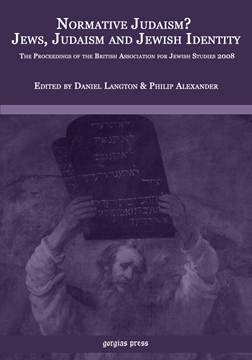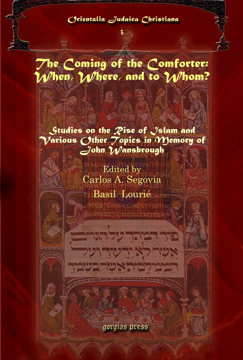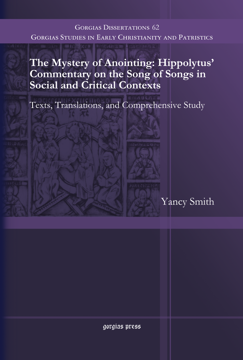Queen Esther’s Garden
An Anthology of Judeo-Persian Literature
ISBN: 978-1-4632-0161-6
This anthology brings to English-language readers the riches of the Judaeo-Persian literary tradition produced by the Jewish community of Iran between the eighth and nineteenth centuries. Most of the translations were prepared specifically for this anthology from unpublished manuscripts. Extensive notes accompany each selection to clarify its meaning in Jewish and Islamic history and legend.
$130.00 (USD) $78.00 (USD)
Normative Judaism? Jews, Judaism and Jewish Identity
Melilah Supplement 1: The Proceedings of the British Association for J.S. 2008
Edited by Daniel R. Langton & Philip S. Alexander
ISBN: 978-1-60724-161-4
This collection of short case studies considers the issue of normatively in Judaism and Jewish identity. The questions of how and why certain aspects of Jewish life and thought come to be regarded as authoritative or normative, rather than inauthentic or marginal, have been and continue to be contentious ones. Topics include the philosopher Moses Maimonides, the composer Felix Mendelssohn, the self-perception of communal leadership in Manchester during the nineteenth- and twentieth-centuries, sermons of Jewish Reform rabbis during the Second World War, Orthodox rabbinic debate about war in general, representations of Jews in photographic exhibitions, the idea of Jewish music, and the academic study of Judaism itself.
$56.00 (USD) $33.60 (USD)
The Coming of the Comforter
When, Where, and to Whom? Studies on the Rise of Islam and Various Other Topics in Memory of John Wansbrough
Edited by Carlos A. Segovia & Basil Lourié
Series: Orientalia Judaica Christiana 3
ISBN: 978-1-4632-0158-6
John Wansbrough is famous for his pioneering studies on the “sectarian milieu” out of which Islam emerged. In his view, Islam grew out of different - albeit rather marginal - Jewish and Christian traditions. In the present volume, which is dedicated to Wansbrough’s memory, specialists in Islamic studies and students of the Jewish and early Christian traditions summarise Wansbrough’s achievements in the past thirty years and chart the future of the tradition study of the “sectarian milieu.”
$208.00 (USD) $124.80 (USD)
Greek Indicative Verbs in the Christian Palestinian Aramaic Gospels
Translation Technique and the Aramaic Verbal System
By Tarsee Li
ISBN: 978-1-61143-895-6
As virtually all Christian Palestinian Aramaic texts consist of translations, one cannot adequately discuss its verbal system without taking into account translation technique. The present study consists of a study of the translation of Greek Indicative verbs in the Christian Palestinian Aramaic Gospels and its implications for the understanding of the Christian Palestinian Aramaic verbal system.
$173.00 (USD) $103.80 (USD)
The Syriac Tradition of the Infancy Gospel of Thomas
A Critical Edition and English Translation
By Tony Burke
Series: Gorgias Eastern Christian Studies 48
ISBN: 978-1-4632-0584-3
A long-awaited and essential tool for the study of one of the earliest texts of the Christian Apocrypha and an important text in Syriac literature, theology, and history.
$168.00 (USD) $100.80 (USD)
The Mystery of Anointing
Hippolytus' Commentary on the Song of Songs in Social and Critical Contexts: Texts, Translations, and Comprehensive Study
By Yancy Smith
ISBN: 978-1-4632-0218-7
The first English translation and study of St. Hippolytus' fascinating, early third-century commentary 'On the Song of Songs'. Important for the history of biblical interpretation, rival identities of early Christians, liturgy, and mystagogy in the pre-Constantinian church.
$243.00 (USD) $145.80 (USD)





